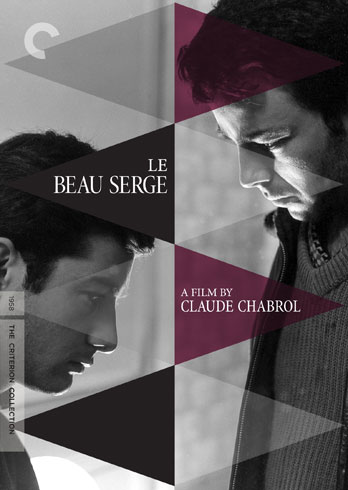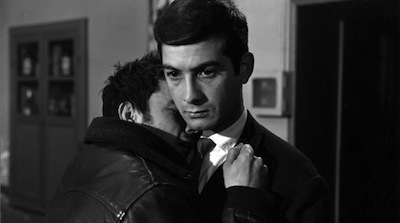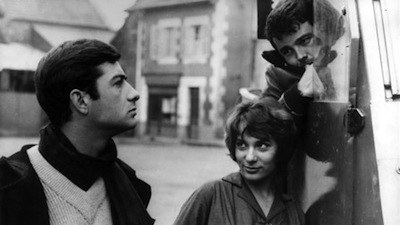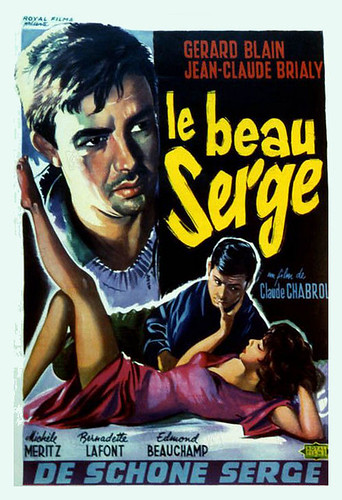
There could probably be plenty of debate about what is considered the first "Nouvelle Vague" motion picture in terms of content or the definition of a style, but when it comes to getting cameras rolling, there is no arguing that Claude Chabrol was the first to break out of the Cahiers da cinema editorial offices and put something on the screen. Le beau Serge was released in 1958, and fittingly, this drama has themes of revisiting the past, of checking the point of origin and seeing how much things have changed. Chabrol could be making a movie about his hometown of Sardent, or he could be making an allegory about the art of cinema: I loved these movies once, but now I've grown past them, so how do I return to the medium I adore and make it work for who I am now.
Jean-Claude Brialy stars in the film as Francois, a man who finds himself back in the small town where he grew up thanks to a tubercular condition. He hopes that by getting some rest away from the city, he can clear up the spot on his lungs. He immediately finds that the place he knew as a child, for as much as it is the same on the surface, is very much changed. Or perhaps it's him, perhaps it's the eyes of an adult that show him his neighbors in a whole new light. When he mentions grown women he doesn't recall from his youth, his guide reminds him that they were young girls when he saw them last, and he cared nothing for young girls.

He did care about his friend Serge, though. Everyone cares about Serge. The title of the film translates as "handsome Serge," and there is something about this dark, charismatic man (played by Gérard Blain) that makes him the center of attention. Chabrol toys with our perceptions on first meeting him. He and his father-in-law and drinking buddy, the old man Glomaud (Edmond Beauchamp), are spied on the opposite side of the bus from where Francois disembarked. Emile Delpierre's music has a sinister surge, suggesting that these men lurking there are a threat. It's like a cue out of Shadow of a Doubt
Serge has taken a wife and taken to drinking since Francois left. He is the small town boy who didn't go anywhere, stuck in the expected job, facing zero prospects. He is as excited to see Francois as Francois is to see him, but he also recoils. He is ashamed of his drinking. Serge is also broken. He married Yvonne (Michelle Méritz) because she was pregnant, but the child was born with birth defects. It is now dead and spoken of in hushed gasps. I may be wrong, but there is possibly some suggestion that it was the product of incest, that maybe it wasn't even Serge's baby. There is certainly something creepy going on, the community is shown as being incredibly insular. It's almost like the backwoods society in some horror movies, complete with the failing priest (Claude Cerval) who knows everyone's sins. Serge has cheated on his wife with her sister Marie (Bernadette Lafont), and there is gossip that Glomaud isn't actually Marie's father. Marie displays some lasting interest in Serge's activities, but she is also quick to jump in bed with Francois, who it turns out is quite the pussyhound.
Though, I have to say, despite his much discussed way with the ladies, I am not sure the incestuous relationships within this small group only consist of opposite sex couplings. There is plenty that one can read into the friendship between Francois and Serge. Francois immediately insists himself back into Serge's life, and he is determined to "save" him from the demon wine and his shrewish wife. Serge plays hard to get and moody, alternately embracing his old friend and toying with him. I wouldn't shoot down a theory that he drinks to obliterate his homosexual guilt and to ease a broken heart over Francois having left him. When he gets blotto and goes wandering the graveyard looking for Francois when Francois is with Marie, it's not because his best friend is screwing a woman he screwed, it's jealousy that Francois is with a woman at all. Or really, anyone that isn't him. Later, tables flip and Serge and Marie team up to manipulate Francois. It's all rather messy.

Visually, Chabrol sees a duality in Sardent, one as simultaneously divided and interlinked as the two men. He and photographer Henri Decaë establish a sense of place when they shoot the town, using some of its cramped quarters to their advantage, but letting our unfamiliarity with the area work in their favor, as well. There is something labyrinthine about its streets, and we are unsure of the distance between, say, Serge's house and Francois' hotel, where Serge often drinks. With the wilderness and farmlands surrounding the burg, there is also a feeling of a greater expanse. Marie's house is farther away--30 yards faster if one journeys through the graveyard--but far enough that they can outdistance Serge, just as the small town is big enough for Serge and Glomaud to disappear on one of their benders. Small enough for everyone to know each other's business--including what Francois got up to when he went away--but also able to keep secrets.
I don't recall us ever finding out what kind of work Francois did on his own. Brialy is cool and collected, and he gives off an aura of success. We get the idea that he was probably always the one that did well, and Serge was always kind of the screw-up. Blain is excellent as the capricious drunk. His eyes have a consistent hint of menace, his smile is mocking, and when he cries, it sounds like laughter. Francois' determination to rescue his friend turns into a kind of holy mission, particularly when he digs in his heels after even the priest tells him to get lost. It's a mission that exists in the abstract, however, until Francois is forced to get real about what is really going on. Yvonne and Serge are expecting a second baby, and despite fears that it will be deformed, as well, she carries it to term. Only, on the night that she goes into labor, Serge is nowhere to be found.
Francois goes on a frenzied search for his friend. He refuses to let his child be born without him. He finds Serge drunk and passed out in the snow and drags him home, literally unthawing him. (And I swear, the way they look at each other, if ever they were going to kiss...) It's a transformative event for both of them, and a hopeful finish for Chabrol's debut. Le beau Serge is a bit of a hothouse flower, nurtured to life by a healthy diet of Faulkner and Tennessee Williams, with even a little Hitchcock in its more hysterical moments (particularly in the music). It's structurally loose, but tight in execution, firmly handled by the first-time auteur. It's a wonderful promise from the artist, and only a hint of what is to come.

This disc was provided by the Criterion Collection for purposes of review.

1 comment:
Yeah this is like a tame super low key French version of Tennessee Williams and it just does not work - this is like pickpocket as an adaption of crime and punishment - doesn’t help that Serge is an uncharismatic stiff
I like Vigo, Godard , beauty and the beast rififi and a few others ... but it’s become clearer and clearer French cinema is not some special thing.
Post a Comment